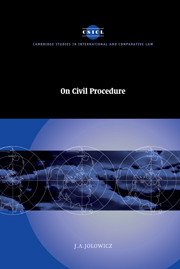Book contents
- Frontmatter
- Contents
- Preface
- List of abbreviations
- Introduction
- I The litigation process
- 1 Civil litigation
- 2 Some twentieth-century developments in Anglo-American civil procedure
- 3 On the nature and purposes of civil procedural law
- 4 The dilemmas of civil litigation
- II Protection of diffuse, fragmented and collective interests
- III Procedural modes
- IV The parties and the judge
- V Recourse against judgments
- VI Procedural reform
- Index
- CAMBRIDGE STUIDES IN INTERNATIONAL AND COMPARATIVE LAW
2 - Some twentieth-century developments in Anglo-American civil procedure
from I - The litigation process
Published online by Cambridge University Press: 18 December 2009
- Frontmatter
- Contents
- Preface
- List of abbreviations
- Introduction
- I The litigation process
- 1 Civil litigation
- 2 Some twentieth-century developments in Anglo-American civil procedure
- 3 On the nature and purposes of civil procedural law
- 4 The dilemmas of civil litigation
- II Protection of diffuse, fragmented and collective interests
- III Procedural modes
- IV The parties and the judge
- V Recourse against judgments
- VI Procedural reform
- Index
- CAMBRIDGE STUIDES IN INTERNATIONAL AND COMPARATIVE LAW
Summary
Introduction
Professor René David has drawn to the attention of every comparative lawyer that the common law ‘est un systéme marqué profondément par son histoire’ and that ‘cette histoire est de facon exclusive, jusqu’ au XVIIIe siécle, l'histoire du droit anglais’. This observation is as true for procedural as it is for substantive law; indeed, as Professor David has also pointed out, for most of its history English law was dominated by procedural considerations: remedies precede rights. ‘Toute l'attention des juristes anglais s'est concentráe pendant longtemps sur les procédures variées, trés formalistes, qui étaient engagées par les differents writs … La common law ne se présente pas comme un systéme visant á protéger des droits; elk consiste essentielkment en des régies de procédures jugées propres á assurer, dans des cas de plus en plus nombreux, la solution des litiges conforméent á la justice.’ Sir Henry Maine's famous statement, ‘So great is the ascendancy of the Law of Actions in the infancy of Courts of Justice, that substantive law has at first the look of being gradually secreted in the interstices of procedure’, is true for the law of England for much of its history.
In the course of the nineteenth century most of the worst technicalities of procedure to which a long history of formalism had given rise were swept away and, so far as the superior courts of England are concerned, the Judicature Acts of 1873-5 created the system which, in its essentials, endures to the present day.
- Type
- Chapter
- Information
- On Civil Procedure , pp. 23 - 58Publisher: Cambridge University PressPrint publication year: 2000



